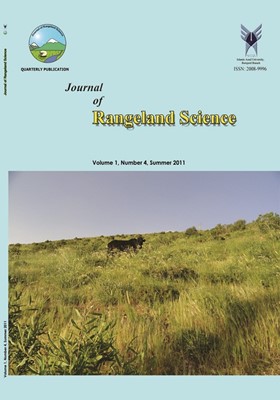Rangeland Ecohydrology, New Paradigm in Water Management of Arid and Semi-arid Lands
محورهای موضوعی : Relationship between Animal and Rangeland
Nasrin kolahchi
1
,
Mohsen Mohseni Saravi
2
,
Ali Tavili
3
,
Mohammad Jafari
4
![]() ,
Ghasem Assadian
5
,
Ghasem Assadian
5
1 - Islamic Azad University, Tehran Science and Research, Branch
2 - Faculty of Natural Resources, University of Tehran University
3 - Faculty of Natural Resources, University of Tehran University
4 - Faculty of Natural Resources, University of Tehran University,
5 - Scientific Board Research Center of Agronomy and Natural Resource, Hamedan province
کلید واژه: Ecohydrology, Qualitative and quantitative deficiency of water resources, Arid and semi arid rangeland,
چکیده مقاله :
At the beginning of twenty-first century, the water crisis in the priority policy andmanagement is inside and outside of the country as principle thoroughly human, social,economic and political rulers of the country is considered abundant. The World Bank hasannounced that during 1960 and 2025, water resources in Middle East, from 3430 m3 for theeach person in year reach to 667 m3 because of population growth, degradation of naturalresources, extent and spread of deserts. Study of ecohydrology in arid and semi aridrangelands of the world is one of the newest methods for available water resourcemanagement. In this science, all of effective ecology elements on water balance equationwere reviewed. In these areas, a strong relation had been seen between ecology and hydrologyprocesses. In these areas, not only lack of precipitation, but also irregular and unpredictabledistribution of precipitation was problematic. Ecohydrology pays particular attention to theseareas of vegetation and its impact on groundwater and surface water.
Contreras Sergio, Boer, Matthias M.
Alcala, Francisco, Domingo, Francisco,
Garcı'a, Mo'nica. Antonio Pulido-Bosch
d, Juan Puigdefa'bregas, 2008. An
ecohydrological modeling approach for
assessing long-term recharge rates in
semiarid karstic landscapes, Jour.
Hydrology, 351: 42–57.
Hultin, K.R. Bush, S.E. West, AG,
Ehleringer, J. R, 2007. Population
structure, physiology and
ecohydrological impacts of dioeciously
riparian tree species of western North
America, Oecologia, 154: 85-93.
Janauer Georg A. 2000. Ecohydrology,
fusing concepts and scales, Ecological
Engineering, 16: 9-16.
Jones, Julia A. Post, David A, 2002. Ecohydrology inferences from paired-basin
forest harvest and regrowth experiments
in New Hampshire, North Carolina, and
Oregon, Jones & Post, Eco-hydrology
inferences.
Mahdavi. M, 1995. Applied Hydrology.
Tehran University Press, second edition,
Tehran, Vol. 1. (In Persian).
Newman Brent D, Wilcox, Bradford P.,
Steve Archer, David D. Breshears, Clifford
N. Dahm, Christopher J. Duffy. Nathan G.
McDowell, Fred M. Philips, Bridget R.
This is trial version
www.adultpdf.com
J. of Range. Sci., 2011, Vol. 1, No. 4 Rangeland Ecohydrology …/308
Scanlon, Enrique R. Vivoni, 2002. The
ecohydrology of Arid and semiarid
Environments: A Scientific Vision.
Pauly, wood, Hannah David. Janathan, M,
Sadler P, 2007. Book of Hydrology and
Ecohydrology past, present and future.
Publication by John Wiley.
Poporato, Laio, A, F. rodriguoz-Iturbe,
L.rldolfi, I. 2001. Plants in watercontrolled ecosystems: active role in
hydrologic processes and response to water
stress IV. Discussion of real cases.
Snyman, Hennie A, 2009. Root studies on
grass species in a semi-arid South Africa
along a soil-water gradient, Agriculture,
Ecosystems and Environment 131: 247-
254.
Statistical Yearbook of Iran. 2000. Planned
management organization, SCI (In
Persian).
Wang Ranghui, Lu Xinmin. 2009.
Quantitative estimation models and their
application of ecological water use at a
basin scale. Jour. Water Resour Manage
23:1351–1365. DOI 10.1007/s11269-008-
9330-0.
Wilcox, Bradford. Throw P. Thomas L,
2006. Emerging issues in rangeland
ecohydrology. Jour. Water Resour
Manage 23:1351–1365. DOI
10.1007/s11269-008-9330-0.
Zalewski m, Janauerga, Jolánkaig. 1997.
Ecohydrology, A New Paradigm for the
Sustainable Use. Conceptual Background
Working Hypothesis, Rationale and
Scientific Guidelines for the
Implementation of the IHP-V Projects
2.3/2.4. UNESCO, Paris, SC-97/WS/12.
Zalewski M. 2000. Ecohydrology-the
scientific background to use ecosystem
properties as management tools toward
sustainability of water resources. Ecol.
Engng, 6: 1.


